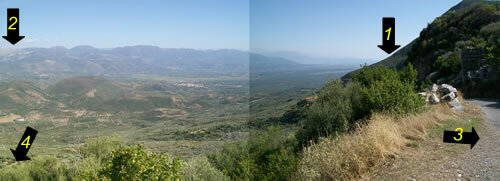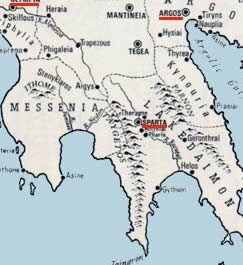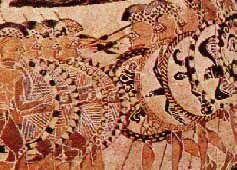Dating:
There is no agreed to dating of this war, but it can reliably be dated somewhere between 743 B.C. and 710 B.C. The war was fought by the Spartans against their fellow Dorians who lived in Messenia.
The evidence to be used for the dating of this war comes from a poem from the Spartan poet Tyrtaeus and clues can also be found from the Olympic victor list.
-Tyrtaeus places the war in the reign of the Spartan King Theopompus. To read the that poem go to Tyrtaeus fragment 5.
-Seven Messenians from 777 B.C. to 736 B.C. are listed as winners of the Olympic Games, but only one more won after that. Wearas the Spartans first victory in the Olympic Games was in 720 B.C. and then dominate the victor list down to 576 B.C.
The Messenian War was the longest running war in ancient Greek history. Even though the war stopped and started over the centuries, hostilities between the states of Laconia and Messenia were constant, even to the point of Sparta officially declaring war on Messenia every year, regardless of their current relationship[1]. This was done to allow Spartanites the legitimate right to kill Messenians if they so choosed, and not offend the gods. The very religious Spartans didn't want to give an excuse to the gods to disapprove of what Sparta was doing.
Reason for the war :
To the ancients they believed there were two different reasons for the war, one claimed by the Spartans, the other claimed by the Messenians. Both these agruments are listed below and handed down to us by Pausanias.
Today, overlying the whole war, there is one reason most scholars put this war down to, and another reason less so.
The scholars (popular) reason for the First Messenian War:
The most likey reason, is that the rich fertile plains of Messenia is what Sparta wanted to conquer, and therefore this lead to this war.
Our reasoning for the First Messenian War:
What we in this web site believe is the following. Messenia generally as a Greek people go were merchants, they dealt alot with people outside what we think today as Greece. Trade was their game, lots of food was produced and therefore wealth was to be had by traders. The port town of Pylos and Kyparissia, still around today were just as busy in those days, as they are today. The major towns of Sicily were dominated by Messenians, indeed one of the most important towns in Sicily then was called Messina (it is still called that today) in reference to these Messenians. Compare that to the inward looking Spartans. In the history of Sparta only one colonisation was ever mentioned and that too was shortly afterward said to be a failure. Dealing in trade was forbidden by full blood Spartanites, war was their only job. Harvesting, blacksmith, pottery or any other work was not done by Spartans.
Sparta feared Messenia, for their wealth, for their influence in other cities, and it was only a matter of time before Messenia with their money would look toward Laconia and want to take them over. For all intensive purposes, they were right, Sparta had to do something first and they did, and this war was sparked off.
Now we can understand better too why Sparta would go to war with Athens, in the Peloponnesian War, because what they always feared from the Messenians they then saw Athens do.

The above is an image that shows the valley that seperates the state of Loconia and the city of Sparta from the state of Messene and the city of Messini. Click on the image to see larger versions of it.
|
Even in the mythological version, the outbreak of hostilities has more than one starting point. The first incident[2] occurred in the borders of Laconia and Messene, where there was a temple of Artemis Limnatis, in which both Spartans and Messenians were celebrating. In the midst of the dance of Spartan virgins, Messenians rushed and took the women. King Teleklos of Sparta, who tried to hinder them, was killed. It was said later that all the Spartan women committed suicide.
But according to the Messenian version[3], King Teleklos had dressed up young men as virgins, with concealed daggers. When their plot was discovered, Messenians after a fight killed Teleklos. Though the war did not start immediately after this event.
The second incident[4] happened with the Spartan Euphaenos and the Messenian Polychares, a distinguished citizen and an Olympic victor, 764 B.C. Euphaenos, who had been trusted with the care of Polychares cows, sold them and later killed his son who came to inquire. Polychares, who was unable to find justice in Sparta, started to kill every Lacedaemonian who passed the borders.
 After these incidents, Spartans demanded from Messenians to deliver Polychares, but in vain and so the war started.
After these incidents, Spartans demanded from Messenians to deliver Polychares, but in vain and so the war started.
Alkamenes, the son of the king Teleklos of Sparta, in a dark night surprised the Messenians and entered the city of Ampheia, near the Laconian boarder, killing everybody. From Ampheia, the Spartans were making constants raids, but they did not succeed to conquer any other cities.
The king of Messenia, Euphaes, fought them with vigor, but for four years no progress was made, by either side. During the fifth year, a big battle took place, which ended indecisive, but after this the Messenians retired to the fortified mountain of Ithome. In the meantime an epidemic fell in Messene, killing many people and Messenians in their distress sent a citizen named Tese to Delphi, to ask about the outcome of the war. The oracle told them to sacrifice a maiden chosen by lot, from the house of Apetidae. The lot fell to the daughter of Lyciskos, who refused to obey and went to Sparta. A leading citizen then named Aristodemos, offered his own daughter, but the youth who was in love with her, declared that she was carrying his child. Aristodemos killed his daughter, opened her body and showed to everyone that this was a lie. After the sacrifice Messenians took courage and attacked. The Spartans, for six years postponed any invasion.
 |
During the thirteenth year of the war, the Spartan king Theopompus. marched against Ithome and another battle took place, but again without a victor. When king Euphaes was killed in action, Aristodemos took his place.
Five years later another battle took place, in which Corinth took the side of Spartan and Arcadians and Sikyonians the side of Messenians. King Aristodemos won a decisive victory over the Lacedaemonians, who were driven back to their territories. Later things turned against Messenians. Aristodemos after a dream, in which his daughter appeared showing to him her wounds, slew himself at her tomb. Shortly afterwards and during the twentieth year of the war, Messenians abandoned Ithome, which was raised to the ground by the Spartans. The defeated Messenians were punished severely and took an oath, that they would never revolt and they would deliver to Sparta every year half of their agricultural products. Many families fled to Arcadia and the priestly to Eleusis. Those who stayed in the country became helots. This was the end of the first Messenian war.
|

Print of the Spartans Capturing Mount Ithome by John A Bryan 1944
|
Not long after the annexation of Messenia (708 B.C.), Sparta founded a colony at Tarentum in South Italy and it seems that the motive was political. A group called themselves Partheniai (children of unmarried mothers), who were not recognized as citizens, attempted revolution and Sparta deemed necessary that the best solution was to send them away.
Aftermath:
It doesn't seem likely that at the end of the First Messenia War that Sparta took Messenia comprehensibly but more likely around 40 to 60% of it. Even with their final victory references to Spartan campaigns to suppress revolts indicate that the Spartans weren't in total control of the area.
Pausanias (4.6.1) refers to poems from Rianos of Bene (2nd Messenian War) and Myron of Priene (1st Messenian War) , both poems are now lost.

